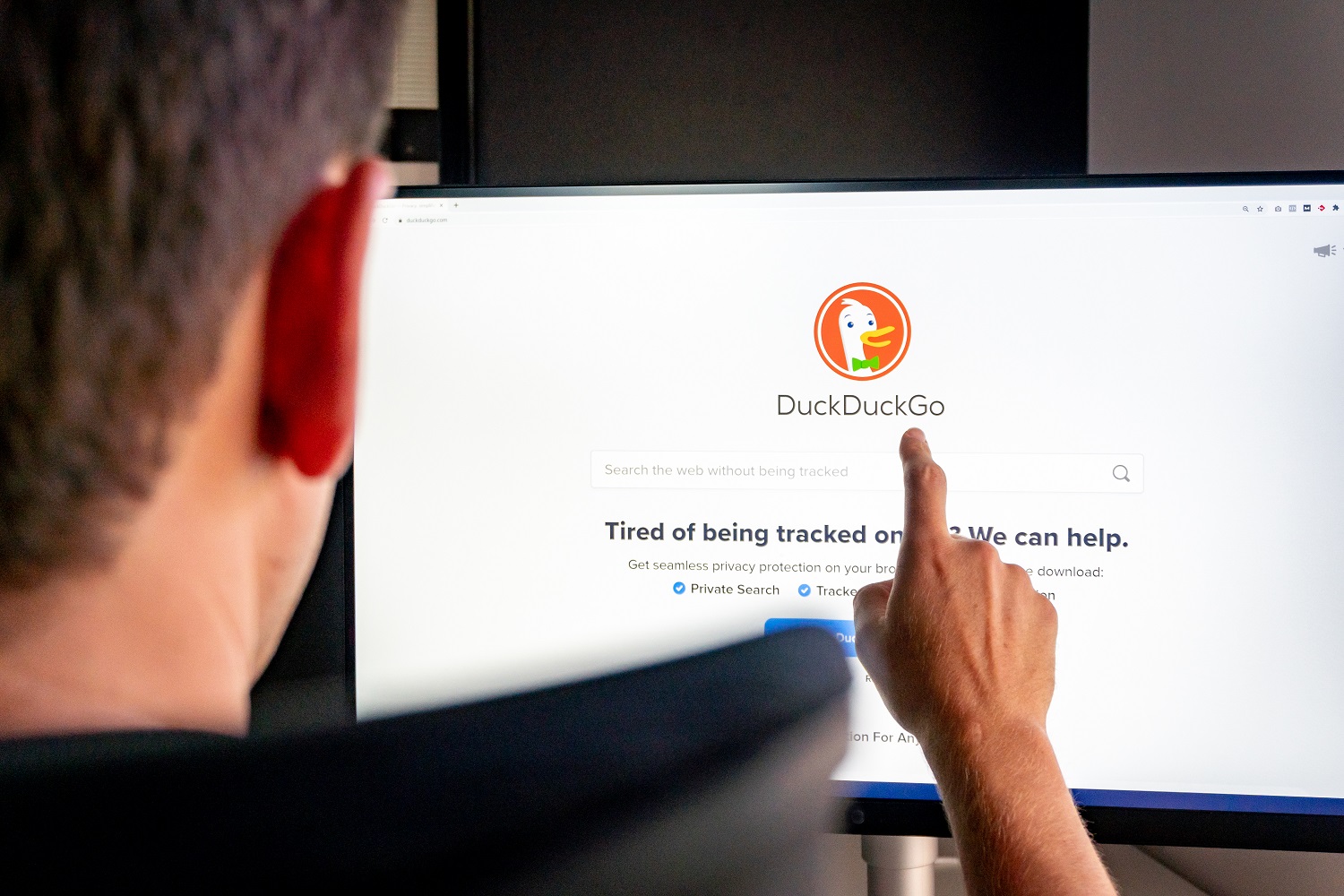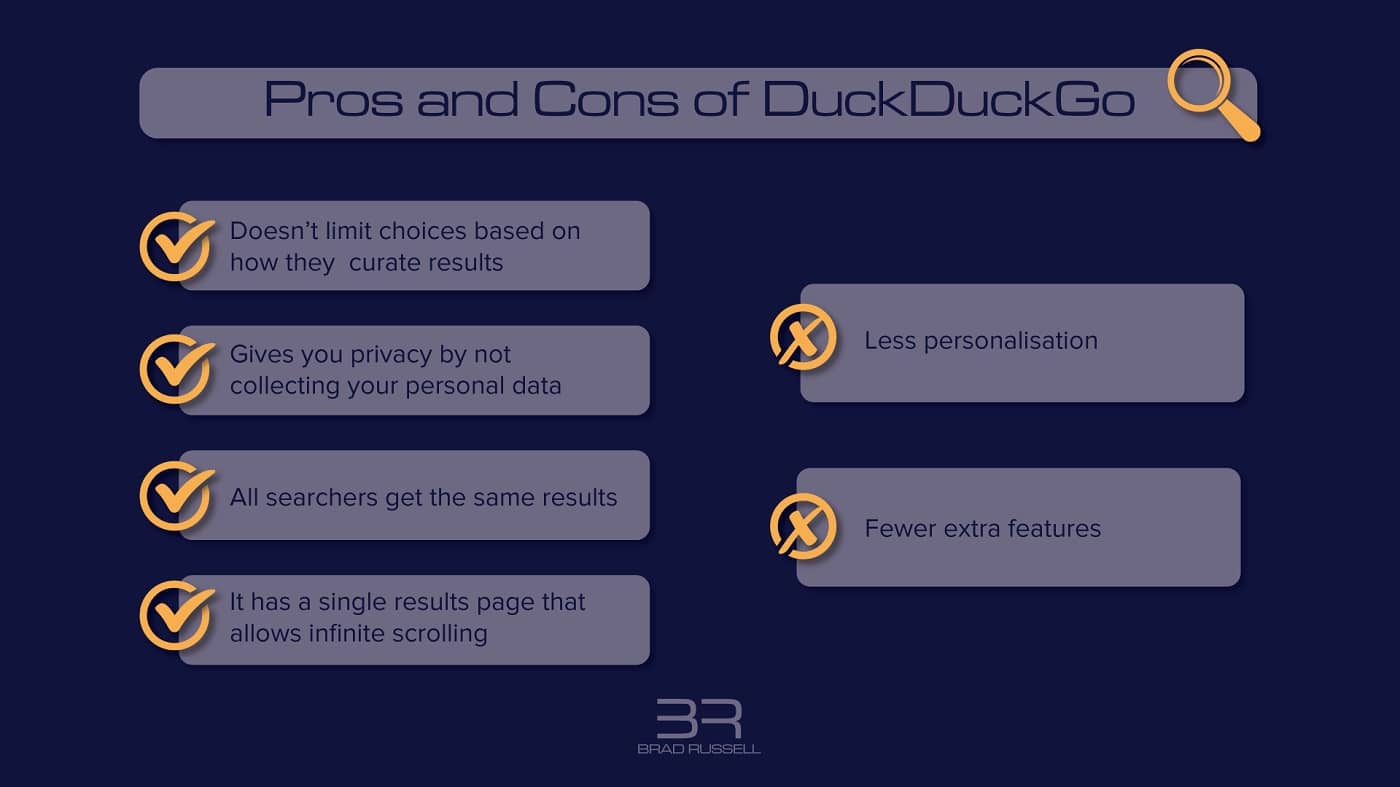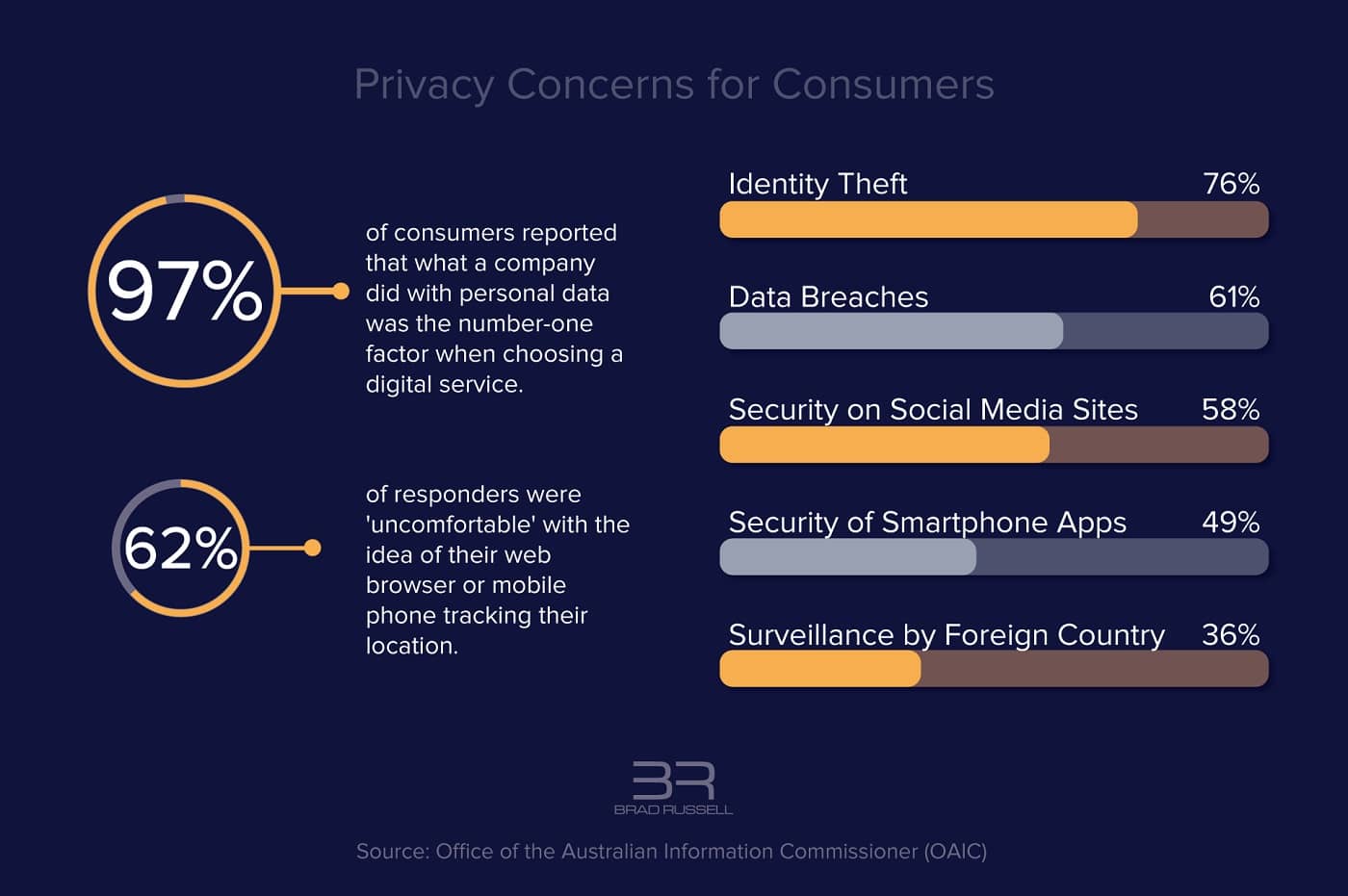DuckDuckGo Is Bigger Than Ever, Should Google Be Concerned?

If you are a part of the virtual marketplace, there is no doubt that a majority of your marketing focuses on Google and its algorithms. The search engine essentially sets the parameters that guide so many aspects of online marketing.
Because it is such a juggernaut, it is easy to believe that Google is the only search engine. However, a search engine with different ideas is changing how we view search, marketing, and the world of e-commerce. The company is DuckDuckGo.
In this post, you’ll learn what DuckDuckGo is, what the benefits of using this search platform are, the differences between DuckDuckGo vs Google, and what will happen if Google decides to leave Australia.
What is DuckDuckGo?
If the duck with a bow tie does not grab your attention, then the company’s name certainly will. DuckDuckGo is a search engine that began in 2008 as the brainchild of Gabriel Weinberg.
What separates it from other search engines like Google and Bing is its over-arching principle of user privacy. The notion of not tracking every user like Google does seem unconventional, but Weinberg would not have it any other way. As it says on their website, they believe the Internet should be less creepy, and privacy should be easy to attain.
Is It Growing?
Since its humble beginnings, it has seen steady growth. After its launch in September of 2008, DuckDuckGo reached a summit of sorts when it logged one million searches a day in February 2012. The sky has been the limit since that 2012 milestone. By 2020 it showed a growth rate of 62%. In January 2021, the company passed the 100 million daily searches mark and shows no signs of slowing.
The company credits a portion of its rise in popularity to incidents that stirred the public’s interest in privacy. An especially jarring event was the 2013 revelation regarding the United States’ National Security Agency’s global surveillance activities. . Likewise, the more recent disclosure of data sharing between Whatsapp and Facebook sparked a jump in traffic for DuckDuckGo.
How Competitive is DuckDuckGo vs Google?
A classic reference like David versus Goliath rings true when you consider DuckDuckGo vs Google. Speaking in terms of market share, they are making small nibbles into Google’s domination of the search engine pie.
According to a January 2021 report from Statcounter, it holds 2.59% of searches. While this seems less than compelling on paper, it means the upstart has the second-highest number of searches in the United States.
Additionally, DuckDuckGo is making waves on a global level. Statcounter reports that it is the second most used search engine for mobile searches in the following countries.
- Australia/Oceania region
- Canada
- The United Kingdom
- The United States
What Are Some Advantages of Using DuckDuckGo?
From a consumer’s perspective, DuckDuckGo offers several features that many searchers appreciate.
- Choice – It is no secret that Google strongly influences search results based on its algorithms. However, Google is limiting choices based on how they curate results. For example, a company may produce the best homemade ice cream in town, but unless it can produce a website to meet Google’s algorithm’s parameters, it will not crack the top ten on the SERPs. Even though claims assert that Google’s position as the default search engine is changeable, the process to switch default search engines takes more than a few steps.
- Privacy – From the beginning, DuckDuckGo placed a high premium on user privacy. A quote from their website reads, “You deserve privacy. Companies are making money off of your private information online without your consent.” It emphasizes that in addition to profiting from collecting personal data, other search engines gather information even if a searcher is in ‘private mode.’ Three ways DuckDuckGo handles personal information differently than Google are:
- It hides and protects a searcher’s IP address
- No personal data is collected
- It does not use cookies to try and discover the interests of searchers
- Consistency – All searchers get the same results. This is because DuckDuckGo does not engage in profiling, targeting, or engineering results.
- Single results page – Over the years, much has been made about the importance of making the first page of Google’s SERP. The make-or-break reality is still the same. However, DuckDuckGo has a single results page. Having one page that allows infinite scrolling without losing results while viewing other pages could be a game-changer.
Does it Have Any Disadvantages?
There are some minor disadvantages when using this search engine:
- Less personalization – Although this seems like an expected result of not tracking users, some people are dismayed that the platform does not remember their search histories.
- Fewer extras – While it has a number of extra features, it does not keep up with the number of convenience items powered by Google.

The pros and cons of using DuckDuckGo.
Why Should Marketers Pay Attention?
In a general sense, even though Google is the dominant force in the search engine world, ignoring other up and coming search engines is a bad idea. Considering the speed at which things change across the virtual marketplace, it is in everyone’s best interest to stay aware of the potential next big thing.
When looking at DuckDuckGo specifically, several factors make the small search engine worthy of consideration:
- It is upending the status quo – Google and other search engines like Bing and Yahoo have tracked searchers’ movements across the web for so long, that the lack of privacy feels almost ordinary. There is a sense that one’s privacy is the admission price for entry to the world wide web. DuckDuckGo shows searchers and marketers that it is possible to combine privacy and search in a way that is also profitable.
- The growing frustration with big tech – The public is increasingly irritated as more information regarding the amount of private information saved and sold by internet giants like Google comes to light. It is easy to sense a desire for an underdog to arrive and offer an alternative to the established big dogs. In the world of search and e-commerce, DuckDuckGo is the underdog. While it may never replace Google, it is becoming the choice of Internet users who dislike what they see as the present invasion of privacy.
- It is number two – While it still has a long way to go to catch Google, the sheer fact that it is the second most popular search engine in many parts of the world means that it should be considered in your long-term digital marketing strategy.
Google Vs DuckDuckGo: What’s the Difference From an SEO Point of View?
The need to create success for clients does not change because a new search engine is gaining traction. After establishing the relevance of DuckDuckGo, the next step is to look at ways to work with the search engine and achieve results clients want.
As is true with all search engines, you will not find one quick formula to create killer SEO results. However, there are a few tips to keep in mind as you consider SEO for DuckDuckGo.
- Learn how queries may differ from those on Google – The fact that it is not tracking searchers and pinpointing locations is a significant factor in search queries. For example: If a searcher uses Google and wants to find a sushi restaurant close by, they type ‘sushi near me’ and Google will list sushi restaurants in the searcher’s vicinity. However, if the same searcher is using DuckDuckGo, the search engine cannot tell their exact location. When a searcher sends a query, the IP address is embedded within it. Even though DuckDuckGo does not save this information, the searcher’s approximate location is traceable, but not 100% accurate. The best course of action for a searcher is to add their location to the query. So, instead of ‘sushi near me’ the best request for DuckDuckGo would be ‘sushi in Perth CBD.’ Based on the subtle difference, some user-focused keyword research will likely be necessary.
- Optimise for Bing search – The upstart search engine is forthcoming about where they pull information for inquiries, and Bing is on the list of sources. It is reasonable to expect that following Bing’s best practices should also tick off boxes for DuckDuckGo. Take time to use Bing’s Webmaster Tools for help with optimisation, site health, monitor crawl, and more.
- Focus on building quality links – This is tried and true advice that comes directly from the company. You need good links to get great results on the SERPs. There are a few differences between good SEO tactics for Google vs good SEO tactics for DuckDuckGo. However, assuming a site’s optimisation is good with Google, DuckDuckGo users will not need to make excessive changes to get good rankings on the smaller site’s SERPs.
Privacy Concerns
With a rise in identify theft, data breaches and the collection of private information, privacy is becoming more of a concern for both consumers and marketers.
Privacy Concerns for Consumers
A survey released by the Office of the Australian Information Commissioner (OAIC) officially names data privacy as a top concern of Australian citizens. Roughly 97% of consumers reported that what a company did with personal data was the number-one factor when choosing a digital service.

The top privacy concerns for consumers in 2021.
The report comes as no surprise as the misuse of personal information makes headlines worldwide on a regular basis. Other causes of concern were:
- Identity theft (76%)
- Data breaches (61%)
- Security on social media sites (58%)
- Security of smartphone apps (49%)
- Surveillance by foreign countries (36%)
A particularly telling statistic from the report shows that 62% of responders were ‘uncomfortable’ with the idea of their web browser or mobile phone tracking their location. An identical percentage of responders felt the same sense of discomfort at the thought of databases storing their online activities.
The data collected in this study points to a growing desire for enhanced online safety measures to protect users from unwelcome tracking and storing of personal information. The importance of privacy comes when upstart search engine DuckDuckGo is capturing larger shares of the search engine traffic.
Privacy Concerns for Marketers
While calls for privacy and limits on data collection and storage do not sound out of line, they do raise questions from another front. Those involved in e-commerce have viable concerns about their industries’ future should collecting and storing of data become severely limited.
A situation based on this concern is presently playing out. The conflict stems from the Apple iOS 14 privacy update. The feature of the changes most troubling to digital marketers and social media platforms is Apples new ‘opt-in’ message that allows users to decide if they want to permit apps to track them.
On the surface, the choice sounds reasonable. However, these changes will come at a high cost to advertisers, social media outlets, and others in the e-commerce world. Included among the potential impacts:
- Limited growth of small businesses due to decreased ability to focus their advertising
- Ineffective advertising
- A loss of personalisation leading to a drop in website sales
- Decreased revenue to social media and other sites that depend on the personalised data for advertising
It seems that for better or worse, changes are coming. Vigilance and flexibility will be necessary to weather the storm.
Recent events in Australia point to a potential growth spurt for the small search engine. When word of legislation proposing big tech companies pay for Australian news content became public, Google balked at the notion. The behemoth went so far as to threaten to remove its search engine from Australia.
The idea of a massive entity such as Google opting to use a ‘take my toys and go home’ approach to law and finance matters left many Australians shaking their heads instead of ‘quaking in their boots’ as Google anticipated.
A week later, Google went a step further. They added a huge pop-up link to a video of its managing director in Australia, Mel Silva pleading its case. Additionally, Silva warns Aussies that the proposed legislation will disrupt how search operates in Australia.
Rather than garner support for its cause, Google’s video became the target of massive ridicule across social media platforms. A significant number of those commenting noted that they already use DuckDuckGo for searches. Others expressed that they are more than happy to make the switch and offered Google a not-so-fond-farewell.
What Search Engine Will Become Australia’s #1 if Google Leaves?
With Google’s promises to leave Australia if it does not get to maintain its disproportionate share of searches, many experts are now eyeing what could be a vast and lucrative void.

What happens if Google leaves Australia?
- At the moment, DuckDuckGo seems to have the edge over other competitors such as Bing and Yahoo in the Australian market. Its most significant selling point is its commitment to protecting the privacy of its searchers. Considering the fact that online privacy is a global hot-topic, it could be in a perfect position to fill the vacancy if Google leaves.
- Bing also has a strong case for picking up the standard should Google leave. In particular, their association with Microsoft puts Bing in a good position for earning the top search engine spot in Australia. Bing does fall short of DuckDuckGo when it comes to user privacy; a shortcoming which could potentially cost them the title of Australia’s number one search engine.
- Even though DuckDuckGo and Bing are the most likely search engines to replace Google should the company leave Australia, it is wise to expect the unexpected. Rumours are buzzing about Apple creating a search engine or being in the process of creating one. If a well-known entity such as Apple were to throw its hat into the ring to be the top Aussie search engine, there could be enough weight behind it to make Apple the leading search engine in Australia.
Only time will tell how this all plays out.


